DESCRIPTION The drive start control is controlled by the ECM.
If
the ECM determines that the shift lever and accelerator pedal are
operated abnormally, driving force is restricted and, when necessary, a
warning is displayed on the combination meter assembly.
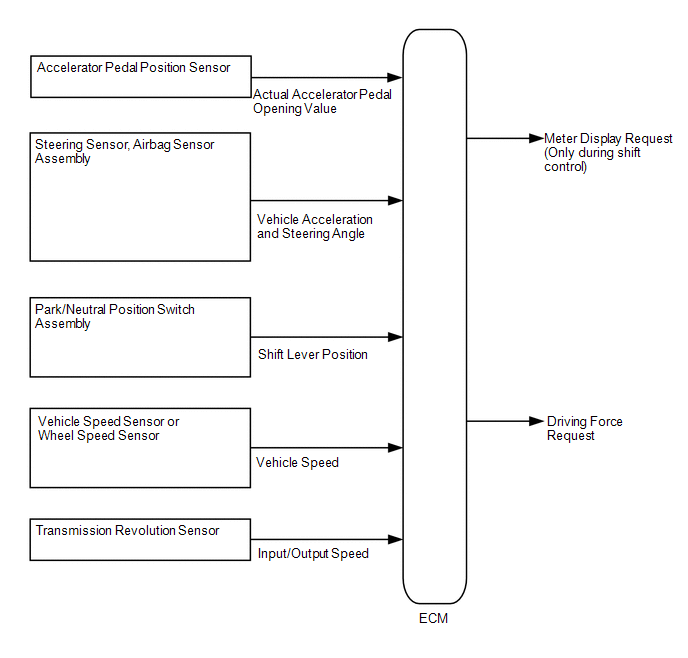 CAUTION / NOTICE / HINT
HINT: Even
if the accelerator pedal position is maintained, the driving force may
increase when driving uphill and decrease when driving downhill. This is
due to the drive start control controlling the driving force, and is
not a malfunction. PROCEDURE
(a) Interview the customer to confirm the problem.
|
Result | Proceed to | |
Hunting | A | |
Hesitation/poor acceleration |
B |
| B |
 | GO TO STEP 8 |
|
A |
 | |
| 2. |
PAST ACTIVATION CONFIRMATION | (a) Check if the customer operated the vehicle in a way that would cause the drive start control to operate. Drive Start Control Activation Conditions Shift control
- Pattern A (When all of the following conditions are met, control starts.)
- The accelerator pedal is open by approximately 1/5 or more.
- The shift lever is moved from P to any forward position (D or S) or R.
- Pattern B (When all of the following conditions are met, control starts.)
- The accelerator pedal is open by approximately 1/5 or more.
- The shift lever is moved from R to any forward position (D or S), any forward position (D or S) to R, or N to R.
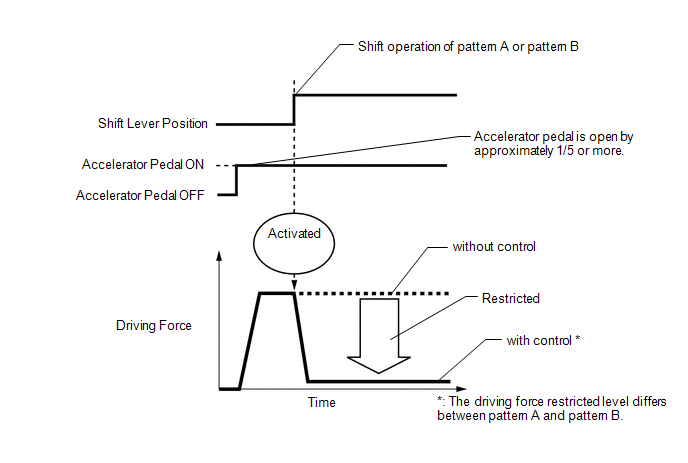
- Items Controlled
- Driving force is restricted.
- Deactivation Conditions
- The accelerator pedal is released.
- The shift lever is in P or N.
Reverse control
- The shift lever is in R.
- The accelerator pedal is depressed excessively.
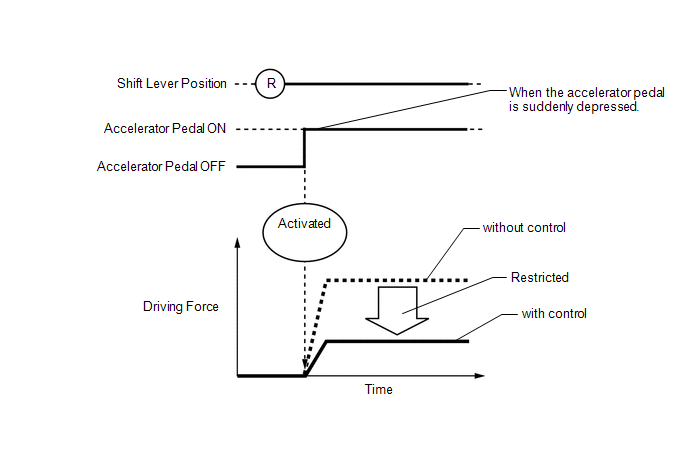
- Items Controlled
- Driving force is restricted.
- Deactivation Conditions
- The accelerator pedal is released.
- The shift lever is moved to any position other than R.
HINT:
- The driving force restricted level differs between pattern A, pattern B and Reverse control.
- During reverse control or shift control, driving force is adjusted based on the road gradient and steering angle.
|
Result | Proceed to | |
Performed | A | |
Not performed | B |
| B |
 | SYSTEM NORMAL (GO TO PROBLEM SYMPTOM TABLE) |
|
A |
 | |
(a) Connect the Techstream to the DLC3.
(b) Turn the engine switch on (IG). (c) Turn the Techstream on.
(d) Enter the following menus: System Select / Health Check. (e) Check the DTCs.
|
Result | Proceed to | |
DTCs are not output | A | |
DTCs are output | B |
| B |
 | GO TO DTC CHART |
|
A |
 | |
| 4. |
READ VALUE USING TECHSTREAM (FR, FL, RR, RL WHEEL SPEED) |
(a) Connect the Techstream to the DLC3. (b) Turn the engine switch on (IG).
(c) Turn the Techstream on. (d) Start the engine. (e)
Enter the following menus: Chassis / ABS/VSC/TRAC/EPB / Data List / FR
Wheel Speed, FL Wheel Speed, RR Wheel Speed and RL Wheel Speed. Chassis > ABS/VSC/TRAC/EPB > Data List
|
Tester Display | | FR Wheel Speed | |
FL Wheel Speed | | RR Wheel Speed | |
RL Wheel Speed | (f) Read the value displayed on the Techstream.
Standard: |
Techstream Display | Condition |
Specified Condition | |
FR Wheel Speed FL Wheel Speed RR Wheel Speed RL Wheel Speed |
Vehicle stopped, engine running |
0 km/h (0 mph) | |
Vehicle being driven at constant speed between 16.1 to 64.4 km/h (10 to 40 mph) |
No large fluctuations when driving at a constant speed |
CAUTION: When performing a drive test, obey all speed limits and traffic laws.
HINT: Data
can be captured relatively easily by using the snapshot function in the
Data List. Confirm the data after performing the drive test.
| NG |
 | INSPECT FRONT OR REAR SPEED SENSOR |
|
OK |
 | |
| 5. |
READ VALUE USING TECHSTREAM (OUTPUT AXIS SPEED) |
(a) Connect the Techstream to the DLC3. (b) Start the engine. (c) Turn the Techstream on.
(d) Enter the following menus: Powertrain / Engine / Data List / Output Axis Speed. Powertrain > Engine > Data List
|
Tester Display | | Output Axis Speed |
(e) Read the value displayed on the Techstream. Standard: |
Techstream Display | Condition |
Specified Condition | |
Output Axis Speed | Vehicle stopped, engine running |
0 rpm | | Vehicle being driven at a constant speed of approximately 60 km/h (37 mph) |
No large fluctuations when driving at a constant speed |
CAUTION: When performing a drive test, obey all speed limits and traffic laws.
HINT: Data
can be captured relatively easily by using the snapshot function in the
Data List. Confirm the data after performing the drive test.
| NG |
 | INSPECT TRANSMISSION REVOLUTION SENSOR |
|
OK |
 | |
| 6. |
READ VALUE USING TECHSTREAM (DECELERATION SENSOR AND DECELERATION SENSOR2) |
(a) Connect the Techstream to the DLC3. (b) Start the engine. (c) Turn the Techstream on.
(d) Enter the following menus: Chassis / ABS/VSC/TRAC/EPB / Data List / Deceleration Sensor and Deceleration Sensor2. Chassis > ABS/VSC/TRAC/EPB > Data List
|
Tester Display | | Deceleration Sensor | |
Deceleration Sensor2 | (e) Read the value displayed on the Techstream.
Standard: |
Techstream Display | Condition |
Specified Condition | |
Deceleration Sensor Deceleration Sensor2 |
During deceleration | Value changes with vehicle speed | |
During acceleration | Value changes with vehicle speed |
CAUTION: When performing a drive test, obey all speed limits and traffic laws.
HINT: Data
can be captured relatively easily by using the snapshot function in the
Data List. Confirm the data after performing the drive test.
| NG |
 | INSPECT AIRBAG SENSOR ASSEMBLY |
|
OK |
 | |
| 7. |
READ VALUE USING TECHSTREAM (STEERING ANGLE SENSOR) |
(a) Connect the Techstream to the DLC3. (b) Start the engine. (c) Turn the Techstream on.
(d) Enter the following menus: Chassis / ABS/VSC/TRAC/EPB / Data List / Steering Angle Sensor. Chassis > ABS/VSC/TRAC/EPB > Data List
|
Tester Display | | Steering Angle Sensor |
(e) Read the value displayed on the Techstream. Standard: |
Techstream Display | Condition |
Specified Condition | |
Steering Angle Sensor |
Steering wheel turned left |
Value increases with steering wheel operation | |
Steering wheel turned right |
Value decreases with steering wheel operation |
CAUTION: When performing a drive test, obey all speed limits and traffic laws.
HINT: Data
can be captured relatively easily by using the snapshot function in the
Data List. Confirm the data after performing the drive test.
| OK |
 | SYSTEM NORMAL (GO TO PROBLEM SYMPTOM TABLE) |
| NG |
 | INSPECT STEERING SENSOR |
| 8. |
PAST ACTIVATION CONFIRMATION | (a) Check if the customer operated the vehicle in a way that would cause the drive start control to operate. Drive Start Control Activation Conditions Shift control
- Pattern A (When all of the following conditions are met, control starts.)
- The accelerator pedal is open by approximately 1/5 or more.
- The shift lever is moved from P to any forward position (D or S) or R.
- Pattern B (When all of the following conditions are met, control starts.)
- The accelerator pedal is open by approximately 1/5 or more.
- The shift lever is moved from R to any forward position (D or S), any forward position (D or S) to R, or N to R.
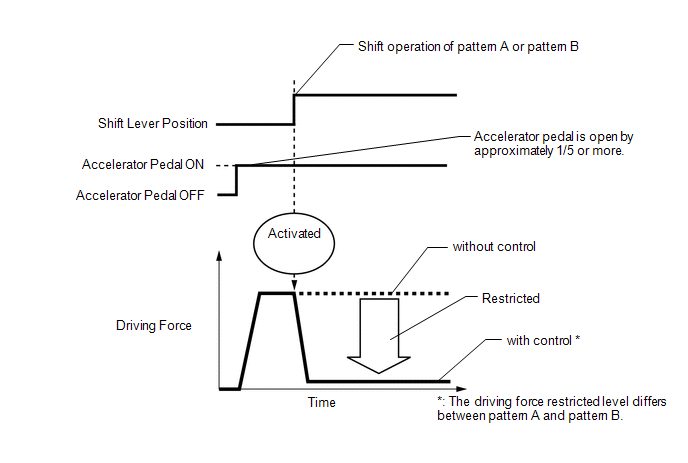
- Items Controlled
- Driving force is restricted.
- Deactivation Conditions
- The accelerator pedal is released.
- The shift lever is in P or N.
Reverse control
- The shift lever is in R.
- The accelerator pedal is depressed excessively.
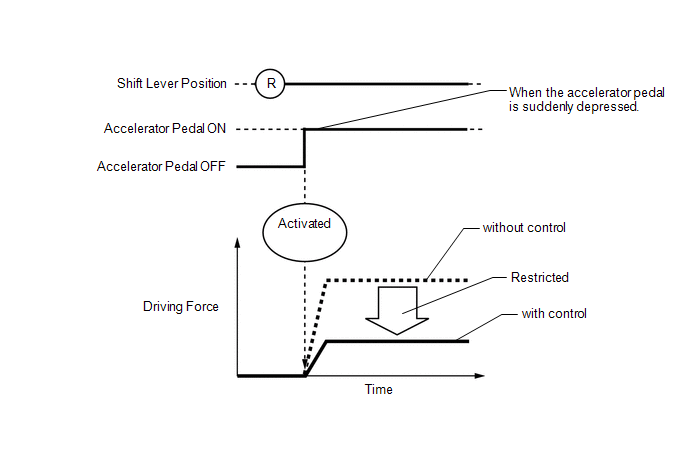
- Items Controlled
- Driving force is restricted.
- Deactivation Conditions
- The accelerator pedal is released.
- The shift lever is moved to any position other than R.
HINT:
- The driving force restricted level differs between pattern A, pattern B and Reverse control.
- During reverse control or shift control, driving force is adjusted based on the road gradient and steering angle.
|
Result | Proceed to | |
Performed | A | |
Not performed | B |
| A |
 | SYSTEM NORMAL |
|
B |
 | |
(a) Connect the Techstream to the DLC3.
(b) Turn the engine switch on (IG). (c) Turn the Techstream on.
(d) Enter the following menus: System Select / Health Check. (e) Check the DTCs.
|
Result | Proceed to | |
DTCs are not output | A | |
DTCs are output | B |
| B |
 | GO TO DTC CHART |
|
A |
 | |
| 10. |
INSPECT PARK/NEUTRAL POSITION SWITCH ASSEMBLY |
(a) Inspect the park/neutral position switch assembly. Click here
 |
Result | Proceed to | |
Normal | A | |
Abnormal | B |
| B |
 | REPLACE PARK/NEUTRAL POSITION SWITCH ASSEMBLY |
|
A |
 | |
| 11. |
READ VALUE USING TECHSTREAM (ACCELERATOR POSITION SENSOR NO. 1 VOLTAGE % AND NO. 2 VOLTAGE %) |
(a) Connect the Techstream to the DLC3. (b) Turn the engine switch on (IG).
(c) Turn the Techstream on. (d)
Enter the following menus: Powertrain / Engine / Data List /
Accelerator Position Sensor No.1 Voltage % and Accelerator Position
Sensor No.2 Voltage %. Powertrain > Engine > Data List
|
Tester Display | | Accelerator Position Sensor No.1 Voltage % | |
Accelerator Position Sensor No.2 Voltage % |
(e) Read the value displayed on the Techstream. OK: |
Techstream Display | Condition |
Specified Condition | |
Accelerator Position Sensor No.1 Voltage % |
Accelerator Pedal Released → Depressed |
Values smoothly change following accelerator pedal operation | |
Accelerator Position Sensor No.2 Voltage % |
HINT: For
numerical values of Accelerator Position Sensor No.1 Voltage % and
Accelerator Position Sensor No.2 Voltage %, refer to the Data List. Click here

| OK |  |
SYSTEM NORMAL (GO TO PROBLEM SYMPTOM TABLE) |
| NG |
 | REPLACE ACCELERATOR PEDAL SENSOR ASSEMBLY | | 